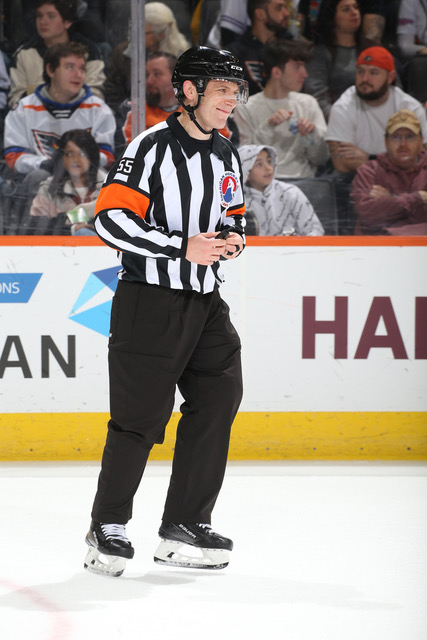This piece originally appeared in our newsletter, “Carnegie Corner,” Issue No. 2.
Dre Barone is a member of The CI’s Board of Directors. He was the first openly gay male in professional hockey. As a referee, he worked four seasons in the ECHL. In 2021, he moved up to the AHL and became the first openly gay male official to work a game in the league’s history. Dre spent two months last year at the Ukrainian-Polish border evacuating Ukrainians and getting humanitarian aid into the country.
CI: Was there a particular instance in your life you recall as the moment you fell in love with hockey?
DB: I was first in skates when I was a year and half old, so it’s not a stretch to say that I learnt how to skate as I learnt how to walk. I have a distinct memory of watching the Habs on TV with my dad when I was 3 years old. Out of nowhere I turned to him and asked, “Can I play hockey?” My dad was planning on signing me up at 5 or 6 years old like he did my two brothers, but I had my say! So, at 3 years old I started pushing chairs on the ice in full, very tiny, equipment. My favorite part of that first 7am ice time was getting to the rink early to get on the ice alone. The freedom and joy of skating around and shooting pucks unsupervised was blissful to me – still is.
CI: As the first openly gay male in professional hockey, you have been a leader and a role model. Was there someone who you looked up to as a role model while you were growing up?
DB: Since there wasn’t anyone else in hockey I can relate to as far as coming out or just being gay, I turned to other sports and music. I remember reading Robbie Rogers’ coming out story. That was the first person to come out in a sport that resonated with me. Also, my role model has always been Bono. I did some work with his charity, the ONE Campaign. Their motto is, “you don’t have to agree with everyone about everything if the one thing you do agree on is important enough.” I still hold that near to me. Whether being myself around the rink or heading over to Poland and Ukraine to help evacuate civilians as I did last year when the full-scale invasion began. In a way it forces me to (almost) always do the right thing.
CI: How would you compare the “reffing world” to the rest of the hockey world, in terms of inclusion and acceptance?
DB: They say the hockey world is small and the reffing world, as you can imagine, is even smaller. That being said, I think it has many parallels to the greater hockey community. I was out to my family, friends, and fellow refs three years before I came out publicly. I wasn’t hiding it by any stretch. The opportunity to come out publicly didn’t present itself to me until I met the great people at OutSports. The majority of my fellow refs wrote to me with supportive words and it’s never been an issue in the locker room. The caveat to that is that my experience as a white, blonde-haired, blue-eyed male isn’t the best sample size to put up against hockey culture’s inclusivity record. There are stereotypes that need to be broken and I hope my story can help someone else be authentically themselves within the hockey community.

CI: There has been a great deal of controversy over Pride events both inside and outside of the hockey world. Where do we go from here?
DB: We just have to move forward. I think it’s disappointing that a handful of players chose not to wear pride jerseys. Most of those players cited their religious beliefs as the reason, while inclusivity is a two-way street, it seems as though it’s a little targeted given that there are other aspects of the game which also clash with religious beliefs. As far as the Pride nights themselves, I think we have to be strategic and pick our battles. We should focus on getting more players speaking out about inclusion through PSA style social media posts, working with their local LGBTQ+ communities, and making Pride Nights a fun celebration for everyone to enjoy. Furthermore, there remains the Pride Tape which players can sport and show solidarity with the community. Lastly, wording matters. Using LGBTQ+ has become kind of catch all term without a specific meaning. Words like gay, trans, lesbian, and bi were for the longest time used as slurs in the hockey world. People need to start referring to others as they are. For example, I’m a gay guy in hockey. I think there needs to be more of that direct language to normalize those words that too often make people uncomfortable.
CI: As a Board Member, what do you see as the most immediate challenges The CI must focus on to see more progress in making the sport more inclusive and welcoming to all.
DB: The CI’s biggest challenge will be continuing to get marginalized people in the hockey community a voice. I think we need to connect those people with decisions makers. Whether it’s the NHL, AHL, USA Hockey, Hockey Canada, the various junior leagues, or the new professional women’s league, all of these organizations have marginalized people within them. Those who don’t have a voice but love the game. The CI needs to give those people a voice so they can tell their story. That is the only way we can collectively learn and not repeat mistakes of the past. The CI should continue to work towards giving the silenced and invisible a seat at the table. As it’s said, if you don’t have a seat at the table, you’re probably on the menu.
